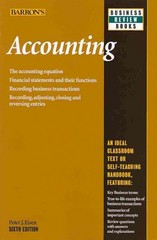Question
Abner owns 1,000 shares of ABC stock, which he purchased 2 years ago at a cost of $40 per share. He sells all of the
Abner owns 1,000 shares of ABC stock, which he purchased 2 years ago at a cost of $40 per share. He sells all of the stock on November 15 of the current year at the market price of $24 per share. On December 10 of the current year, Abner notices that the market price has gone up to $32 per share, so he once again thinks ABC is a good investment and buys 1,000 shares at the market price. What is Abners basis in the new stock and what amount of loss, if any, will he recognize on the November 15 sale?
| $32,000 ($32 per share) basis and a realized long term capital loss of $16,000. | ||
| $32,000 ($32 per share) basis and no realized gain or loss. | ||
| $40,000 ($40 per share) basis and a realized long term capital loss of $16,000. | ||
| $48,000 ($48 per share ) basis and no realized gain or loss. | ||
| None of the above. |
Step by Step Solution
There are 3 Steps involved in it
Step: 1

Get Instant Access to Expert-Tailored Solutions
See step-by-step solutions with expert insights and AI powered tools for academic success
Step: 2

Step: 3

Ace Your Homework with AI
Get the answers you need in no time with our AI-driven, step-by-step assistance
Get Started


